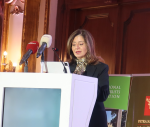You are here
Through Syria, ‘Russia will assume an influential role in the region’
Aug 02,2017 - Last updated at Aug 02,2017
Russia’s covert intervention on the side of Republican candidate Donald Trump in last year’s presidential campaign has boomeranged against him.
Before and after taking office, Trump had pledged to improve relations with Moscow, but he has been overruled by Congress, in spite of its Republican majority.
In response to Moscow’s pro-Trump efforts, legislators voted to impose fresh sanctions on Russia as well as Iran and North Korea.
Last December, the Obama administration took over two Russian diplomatic compounds in the US in response to allegations of Russian meddling in the election.
Russia did not react with tit-for-tat measures in the hope that Trump would revoke this measure, but not only did he fail to do so, he is in no position to veto the bill either.
This is due to the fact that Russia has been thoroughly demonised and has been grouped with Iran and North Korea, which is being sanctioned for testing long-range ballistic missiles Congress sees as threats to the continental US.
Russia has responded to the congressional measure by calling on the US to cut its 1,200 diplomatic staff in that country to 455, the number of Russians posted to US missions, and has seized properties used by US diplomats.
Some lawmakers are threatening to retaliate by forcing Russian diplomats posted in Washington to apply for permission before travelling outside the US capital.
US Vice President Mike Pence — who represents Republican conservatives — has exacerbated the estrangement between Washington and Moscow by insisting that both he and Trump agree that Russia must “change its behaviour” towards Ukraine, Iran and elsewhere before relations can improve.
The problem with the US Congress is that it is filled with ageing legislators who continue to exhibit a Cold War mentality, although the Cold War ended at the end of the 1980s.
Having, perhaps, benefitted from Russian hacking during the election campaign, Trump and Pence have not been allowed by the legislature and the Justice Department to let Russia off the hook for supposed meddling.
Indeed, both Congress and the Justice Department have served as checks on the president’s powers on this highly sensitive issue.
So far, fortunately, this has not impacted developments in this region and Russian President Vladimir Putin denied that it will.
But tit-for-tat measures adopted by the two sides put cooperation against Daesh in Syria at risk and could undermine Russian-led negotiations aimed at ending the Syrian conflict.
So far, the Trump administration has said that US-backed forces in Syria must focus only on defeating Daesh, and has distanced the US from insurgents attacking Russian-supported Syrian government forces in the eastern border areas of the country.
A negotiated settlement in Syria depends, above all, on US-Russian cooperation. This will be all the more important after Daesh is defeated and its fighters routed.
Once this happens, Washington and Moscow will have to take action against Al Qaeda’s Jabhat Fatah Al Sham (formerly Jabhat Al Nusra), the dominant takfiri group in the insurgent-packed northwestern Syrian province of Idlib.
This will be all the more difficult because the Jabhat-controlled Hay’et Tahrir Al Sham coalition is allied with Turkey and enjoys the backing of Qatar and other regional players.
Although the US officially regards Jabhat as a “terrorist” group, the Obama administration tied itself to the group’s associates by training, funding and arming their fighters.
They often joined forces or shared weapons with or defected to the Jabhat in spite of its connection with Al Qaeda, the organisation that mounted the New York and Washington attacks on September 11, 2001.
Trump attempted to end this shameful policy by halting the largely unsuccessful drive of the CIA to recruit and train “vetted” insurgents — most of whom are against the Russian-supported government rather than Daesh.
Trump’s insistence on focusing on Daesh is welcome, but he must soon shift the attention of the US military to Jabhat.
The takfiri challenge in Syria and Iraq does not end with victory over Daesh. Indeed, Al Qaeda’s spawn are as dangerous as Daesh, for, their agenda is not only establishing and maintaining
a false “caliphate” in Syria and Iraq, but also converting Muslims to the takfiri ideology, the very same goal adopted by Daesh.
Trump proved to be self-seeking, erratic and unreliable during his 194 days in office and has, unfortunately, surrounded himself with generals who fought in Iraq and millionaire businessmen.
These men are rabidly anti-Iran, the key regional power involved in the Syrian conflict, and do not want to see Tehran exploit its support for the Syria government as a means to extend its influence to Syria as it has done in Iraq, thanks to George W. Bush’s installation of a pro-Iranian Shiite fundamentalist regime in Baghdad.
Syria is not Iraq.
Unlike Iraq, the majority of Syrians are Sunni, rather than Shiite. Syrian Sunnis and others can be counted on to resist Iranian advances because they are accustomed to a government that, although portrayed in the West as dominated by the country’s Alawite minority, is multiconfessional and secular.
Trump’s anti-Iran advisers may not believe Syrians would reject Tehran’s interference in post-war Syrian domestic and external affairs and extend US support to Sunni opponents of the current government.
However, the Sunnis Trumpites are likely to support would be takfiris or Muslim Brotherhood members, whose very presence in Syria would perpetuate a conflict that has gone on far too long.
By adopting punitive measures against Moscow, rather than cooperating with Russia in Syria, US cold warrior politicians may also hope to reduce Russia’s role in Syria and this troubled and strategic region.
However, Russia has already staked its claim to permanent military bases on the Syrian Mediterranean coast as its reward for providing arms and air cover for Syrian loyalist forces.
Furthermore, by playing a determining role in winding down the Syrian war, Russia will assume an influential role in the region, a position Moscow lost when the Soviet Union collapsed.












